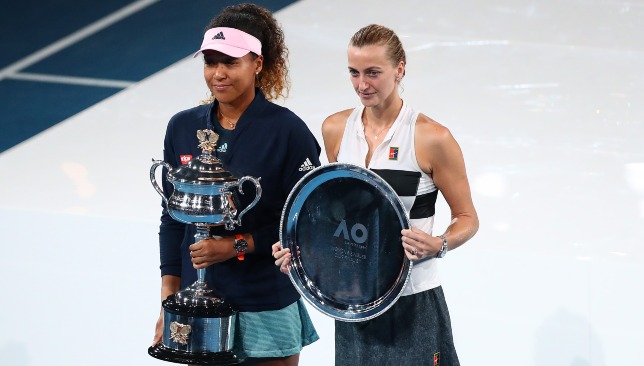
There is no stability in women’s tennis they say. It’s Serena Williams and then everyone else they argue. These first-time Grand Slam winners are flukes they claim.
Those are just some of the stereotypes that have erroneously been attached to the women’s game in recent years.
People who have been paying close attention to the WTA tour throughout the year, and are not just tuning into the Grand Slams, know very well how deep the field has become and how stiff the competition is.
This past fortnight in Melbourne, the women finally showed the world that there can be stability from the ladies on the major stage, and there can be continuity.
Naomi Osaka on Saturday became the first woman since Jennifer Capriati in 2001 to follow up a maiden Grand Slam title success by winning the very next major.
The 21-year-old did it by overcoming two-time Wimbledon champion Petra Kvitova in a three-set thriller that epitomised many of the things people love about this sport.
In a final where it felt like everyone was rooting for both of them, Osaka and Kvitova reminded us how boom-boom tennis can be so much fun, and equally tense.
Osaka saved five break points in the opening set, withstanding some powerful returns from the 28-year-old Kvitova and took a commanding lead. The young Japanese then got three championship points on Kvitova’s serve in the ninth game of the second set. It looked like it was all going to be over for the Czech lefty.
Osaka had won her last 59 consecutive matches after winning the opening set. Surely she was going to close this out. But then again, there’s a reason why Kvitova’s nickname is ‘P3tra’ – she doesn’t back down and has a knack for winning in three sets.
Kvitova dug deep and produced some clutch tennis to save all three match points and held for 4-5. Now it was Osaka’s turn to serve for the title. Instead she got broken, soon lost the second set, and cried as she walked off court to take a toilet break.
Almost everyone watching thought that collapse from Osaka would spell the end of her bid for a second consecutive Grand Slam title. Kvitova is experienced and when she held in the opening game of the deciding set, it was the fifth game she had won in a row.
Unfazed, Osaka then took three games on the trot. She was playing like that second-set collapse never happened. She erased those lost championship points from her memory, forgot about those tears that were flowing down her cheeks, and got back to work. That is an amazing ability to have. Instead of dwelling on what could have been, Osaka was already locked in on the present, with an eye firmly fixed on her goal. For a 21-year-old who was ranked outside the top-70 just a year ago, that’s just emotional maturity you cannot buy.
Kvitova, the sport’s most beloved fighter, kept on fighting. But when Osaka got a second chance to serve out the match, she did not make the same mistake twice. Her coach and fitness trainer always cite her ‘teachability’ as one of her greatest assets. She showed how much of a fast-learner she is by serving out the match less than an hour after she failed to accomplish that in the second set.
“I think that was a huge effort from her. There’s nothing harder than to change the way you feel about things in an instant, especially on a stage like this, and she really showed maturity in getting her emotions under control and finding another way to win again. I’m really proud of her for that,” said her coach Sascha Bajin.
Her fitness trainer, Abdul Sillah also had complete faith in her.
“I had no doubt. It’s about mindset and mental toughness. We have a new slogan we call ‘EAT all day’, it means ‘effort, attitude and toughness’. So I knew eventually when she went to go reset, she knew what to do after that,” Sillah told Sport360.
In Osaka’s mind, not breaking Kvitova’s serve in that game where she had match points is not the end of the world, after all this is Petra Kvitova, and her lefty serve is the envy of most players on tour. Accepting that and moving on was the only choice in Osaka’s mind.
As for Kvitova, there will never be enough superlatives to describe her courageousness. She is not someone accustomed to losing finals – she had won her last eight consecutive finals before Saturday’s defeat and was 26-7 overall in title matches – so this one obviously stings. But she also can see the bigger picture, and the fact that two years ago she couldn’t hold a racquet and had just survived a knife attack will help her move past this.
Kvitova inspires in victory and in defeat because she already won the biggest battle of her life.
Osaka is the new world No. 1. Kvitova is No. 2. Simona Halep is No. 3. Women’s tennis is lucky to have such a trio at its helm. Now make sure you follow their journeys all year instead of checking in every Grand Slam. The thrill and drama is just getting started!